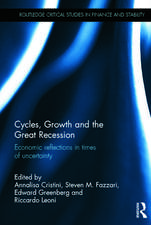Social Pacts, Employment and Growth: A Reappraisal of Ezio Tarantelli's Thought: AIEL Series in Labour Economics
Editat de Nicola Acocella, Riccardo Leonien Limba Engleză Hardback – 8 ian 2007
| Toate formatele și edițiile | Preț | Express |
|---|---|---|
| Paperback (1) | 640.71 lei 43-57 zile | |
| Physica-Verlag HD – 28 oct 2010 | 640.71 lei 43-57 zile | |
| Hardback (1) | 646.62 lei 43-57 zile | |
| Physica-Verlag HD – 8 ian 2007 | 646.62 lei 43-57 zile |
Preț: 646.62 lei
Preț vechi: 760.73 lei
-15% Nou
Puncte Express: 970
Preț estimativ în valută:
123.73€ • 129.53$ • 102.38£
123.73€ • 129.53$ • 102.38£
Carte tipărită la comandă
Livrare economică 07-21 aprilie
Preluare comenzi: 021 569.72.76
Specificații
ISBN-13: 9783790819151
ISBN-10: 3790819158
Pagini: 303
Ilustrații: XI, 291 p.
Dimensiuni: 155 x 235 x 25 mm
Greutate: 0.59 kg
Ediția:2007
Editura: Physica-Verlag HD
Colecția Physica
Seria AIEL Series in Labour Economics
Locul publicării:Heidelberg, Germany
ISBN-10: 3790819158
Pagini: 303
Ilustrații: XI, 291 p.
Dimensiuni: 155 x 235 x 25 mm
Greutate: 0.59 kg
Ediția:2007
Editura: Physica-Verlag HD
Colecția Physica
Seria AIEL Series in Labour Economics
Locul publicării:Heidelberg, Germany
Public țintă
ResearchCuprins
Globalization, labor markets and welfare states: a future of “competitive corporatism”?.- Social Pacts in Tarantelli’s Thought.- ‘Doing good’. Ezio Tarantelli’s Approach to Political Economy.- The 1960s and Ezio’s Awakening to the Social Problems of Italy.- The Implementation of Tarantelli’s Proposals.- Employment Growth in Italy in the 1990s: Institutional Arrangements and Market Forces.- The July Protocol and Economic Growth: The Chance Missed.- The’ 93 July Agreement in Italy: Bargaining Power, Efficiency Wages or Both?.- Social Pacts in Europe.- Wage Bargaining Institutions in Europe. A Happy Marriage or Preparing for Divorce?.- Industrial Relations and Macroeconomic Performance.- Wage Setting Institutions and Economic Performance.- Loops Learning and the Phillips Curve.- Wage Inequality in Europe: the Role of Labour Market and Redistributive Institutions.- For a Theory of Social Pacts.- Searching for the EU Social Dialogue Model.- From First- to Second-Generation Social Pacts.- Alternative Solutions to Conflicts.- Inflation Inertia, Monetary Policy and Market Competition: Tarantelli Revisited.- Creating the ‘Neo-Lisbon’ Economy.
Textul de pe ultima copertă
Social pacts have long been a centerpiece of European politics. They are characterized by negotiations among government, employers, workers, and other interest groups over wages and other economic issues. With the growth of globalization and pervasiveness of knowledge, some economists have called for a reduced role of social pacts and centralized wage bargaining, to be replaced by increased flexibility in labor agreements; others argue in favor of social pacts with contents and orientation different from those that have characterized the last three decades. In this book leading European economists examine the current status of social pacts and their future. Particular focus is placed on the ideas of Ezio Tarantelli, a young Italian economist killed by Red Brigades in 1985. He thought that trade unions could play a positive role by agreeing to set wages on the basis of a target rate of inflation. Therefore, they would contribute to economic and social stability through influencing future price expectations, protecting real wages. But, if inflation did erode real wages, the government could compensate the union(s) through increased social expenditure. As the European Union expands and social change accelerates, this insightful book will be of interest to all concerned with social and economic developments across Europe.
Caracteristici
Includes supplementary material: sn.pub/extras























